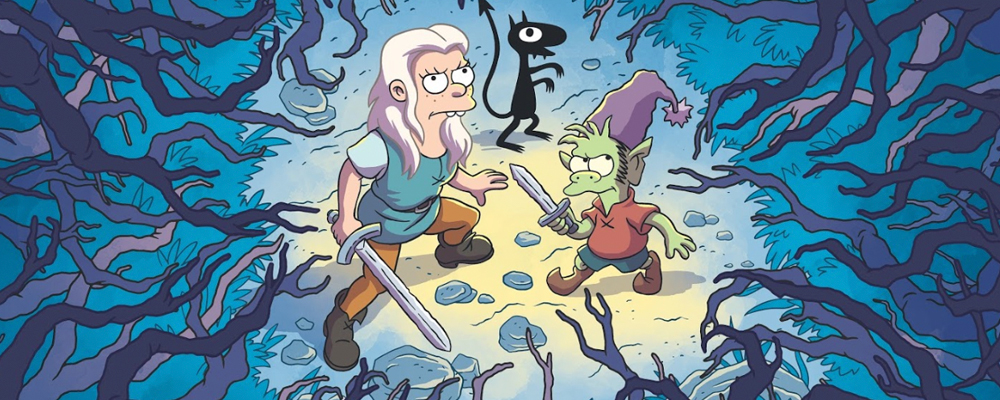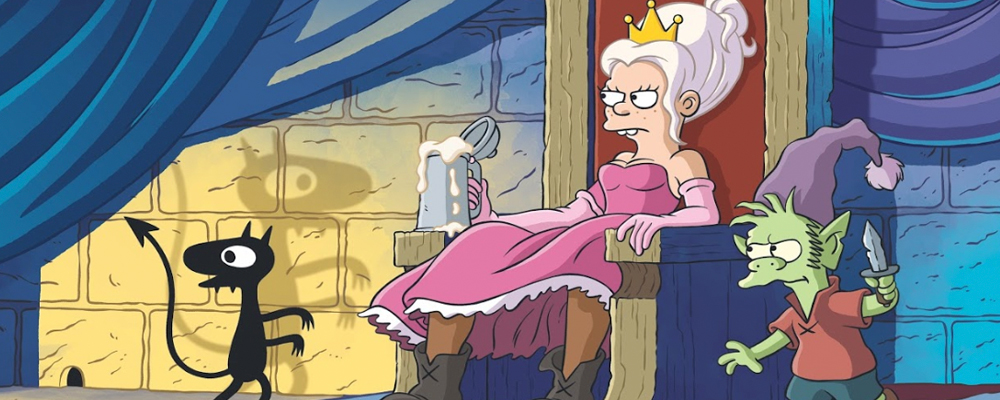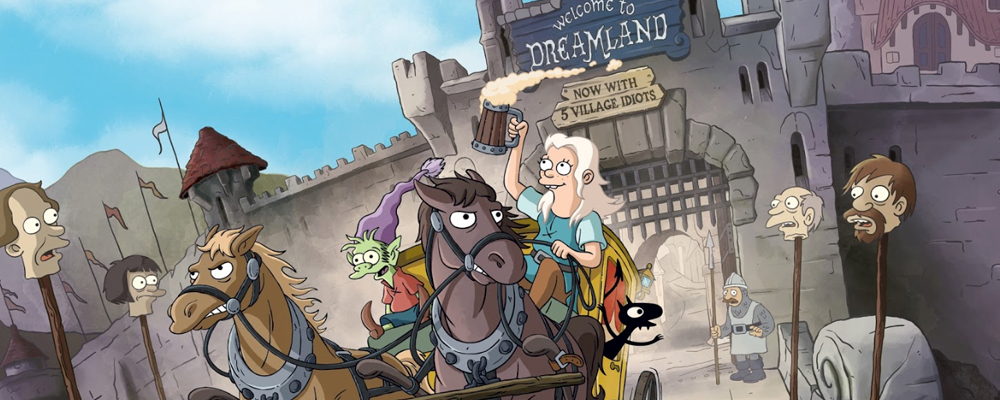Matt Groening’s New Netflix Series ‘Disenchantment’ Takes Wicked Aim at Storybook Fantasies
Alci Rengifo
Netflix’s new animated series “Disenchantment” merrily distorts our ideas about fairy tales with a fun wickedness. This marks the Netflix debut for Matt Groening, creator of the iconic “The Simpsons” and cult classic “Futurama,” now bringing his particular brand of satire to the world of storybook fantasy. You would expect Groening and team would completely bask in crafting a show without the constraint of ratings systems. Alas, he never quite goes for broke and always stays a few feet within the safe zone. Still, the first season of “Disenchantment” is far from boring. It’s a fun romp with memorable sights and zesty humor.
Welcome to the kingdom of Dreamland, where kings, queens and peasants live in a world of magic and adventure. However for Princess Bean (Abbi Jacobson) life isn’t so grand. She’s a hard-drinking, free spirited soul who gets annoyed with the royal duties her father, King Zog (John DiMaggio), tries to impose on her, like arranged marriages. Regular dating is hard for Bean because all the guys are scared off by her ruthless dad. Meanwhile in a land of elves where everyone slaves away making candy (while feigning orgasmic joy), Elfo (Nat Faxon) isn’t feeling too jolly. After ruining a particular batch of candy, he’s condemned to being hung from a gumdrop tree but escapes. He makes his way to Dreamland where he meets Bean. Another character thrown into the picture is a sarcastic demon named Luci (Eric André), sent by practitioners of dark magic with their own designs on the throne. Luci warns Bean that he’s the little guy on your shoulder telling you to do the wrong thing. The trio will now embark on a series of misfit adventures complete with everything from Viking marauders to ill-advised hook ups.
“Disenchantment” thrives on being a fun time with every episode of this first season. Groening and co-producer Josh Weinstein bask in applying the trademark animation style of “The Simpsons” and “Futurama” to a medieval setting. Every episode is entertaining just by the small details. Carts with dead plague victims are rolled down streets, alcoholic ferries fly around in the woods, in the distance we can see a ship pulled down into the sea by giant tentacles. With the spirit of medievalists making fun of their own obsessions, the team behind this series manages to create a colorful world that becomes uniquely familiar by the season finale. “We wanted it to have a touch of authenticity, but to look like a beautiful storybook setting,” Weinstein recently told Entertainment Voice. Indeed, but of the show’s wicked charm is how it looks like the kind of bedtime reading many of us had as pre-schoolers, but now adorned with naughty jokes. Classic medieval settings and themes are turned into hilarious bits. Bean is sent to a convent named Our Lady of Unlimited Chastity, where the sisters chant in monotone before every meal. An exorcist is called in to cast out Luci, who simply possesses Bean and spins her head around in an homage to “The Exorcist” (“I didn’t know the human body can do that”). An executioner tortures and kills witches and other prisoners like a guy just going to a regular day job. There are one-liners in that Groening style throughout. Bean stays with a peasant family where the mother says, “this is Bean, she’s going to stay with us until she realizes how good she has it.”
Free from the constraints of network TV, “Disenchanted” flirts with being able to push the envelope a little further. Elfo is nearly hung from a gumdrop tree, he wanders into a battle between gnomes and ogres that becomes quite vicious and bloody, complete with decapitations and swords stabbing into eyeballs (in cartoon fashion of course). There are actual deaths as gags and raunchy jokes about getting laid. But Groening never allows the material to descend too much into toilet humor, keeping it just funny enough. “We really censor ourselves, because Netflix gives you complete freedom. In the very first script we had a character say the word ‘shit,’ and it didn’t feel right just having characters curse because they could. We could go a little more adult, but we’re still keeping it like ‘Futurama,’ where if there are more risqué jokes they’ll go over kid’s heads but adults will get them,” said Weinstein about the tone of the humor. “It’s a real craft and trick. We have to write what we think is funny, and what we feel is right coming from the characters. We started first by figuring out what were the best stories for these characters, and letting the comedy come from that.”
Much of the humor derives from the main three characters, who are the perfect satirical takes on the personas we see in the swords and magic shows now in vogue like “Game of Thrones.” Bean is a proto-feminist, demanding equal treatment and the right to make her own decisions, especially when Zog tries to marry her to egomaniacal princes who are so stupid they mistake singing walruses for mermaids. She wants to party, drink till she drops and get it on with Nordic invaders with big accents (who might end up slaughtering all the party goers). Elfo has a crush on Bean but he is disconnected from all things normal to life, his understanding of love and sex is at the level of a 5-year-old. This doesn’t stop Luci from taking advantage and encouraging him to do hilariously humiliating moves. Luci is indeed the edgiest and possibly funniest character. Because he’s a small demon from the underworld he’s free to give Bean the worst advice (“Just kill him. Come on, do it”), practice outright debauchery and not flinch when letting someone fall off a castle tower. As voiced by Eric André, Luci is smooth sarcasm, cackling before going to sleep, “I’m going into your dreams tonight as a laughing skull. Yeah, that’s me.”
“Disenchantment” will offer much to fans of classic Matt Groening, with his trademark style made slightly more daring by the Netflix format. The show never goes too beyond a little more risqué humor and a bit more bloodshed, but it’s also delightful and mischievous in much of its material. It can make us smile and cackle. As Weinstein puts it, “we’re living in fairly dark times, certainly a lot of people think so, the value of comedy is especially valuable to remind yourself that you can still laugh and point our hypocrisy and stupidity in the world. In times like these, it’s very valuable to laugh, especially since our shows takes place in the dark ages.”
“Disenchantment” season one premieres Aug. 17 on Netflix.



